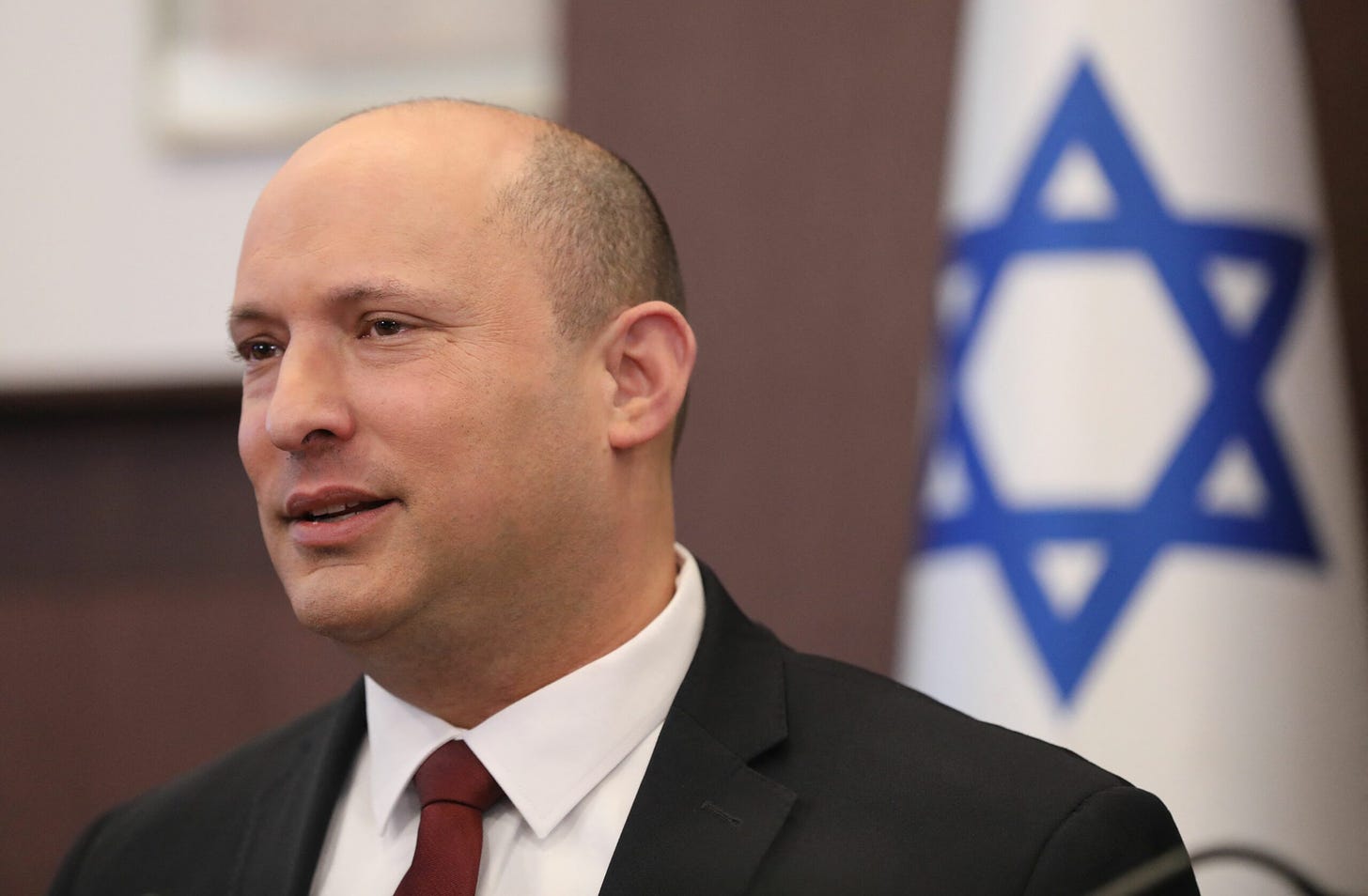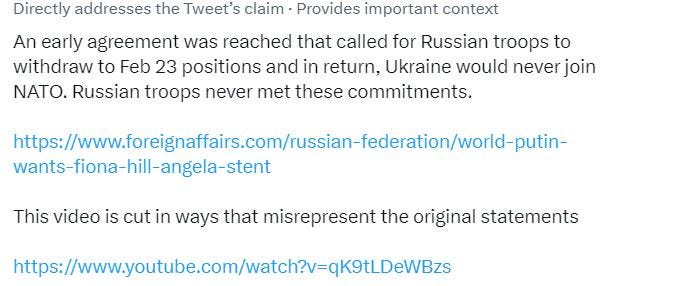
No, Elon, the U.S. Didn’t Scuttle a Ukraine Peace Deal
Twitter contrarians—given the spotlight by Elon Musk—distort an interview by Israel’s ex-PM.

As the anniversary of Vladimir Putin’s Ukraine invasion nears, the narrative blaming Western leaders for the war’s continuation got a seeming boost from former Israeli Prime Minister Naftali Bennett, much to the excitement of the horseshoe-shaped Kremlin appeasement lobby on the nominal left and right. A nearly five-hour interview Bennett gave to Israeli journalist Hanoch Daum, posted on the former prime minister’s YouTube page on February 4, promptly gave rise to an incendiary claim from Aaron Maté, a vocal Twitter critic of international support for Ukraine: https://twitter.com/aaronjmate/status/1622226750297051137 Other usual suspects weighed in, complete with the requisite one-word concern trolling from Twitter CEO Elon Musk: https://twitter.com/DavidSacks/status/1622460232193687552 https://twitter.com/mtracey/status/1622636568165986304
Concerning
— Elon Musk (@elonmusk) February 7, 2023
(Among those who shared Tracey’s tweet: Thomas Massie, the Republican congressman from Kentucky.) There’s only one problem: Bennett didn’t actually say what Maté and his amen chorus claimed he said. In fact, when Maté posted a two-minute video clip condensed from the Bennett interview (the Russia/Ukraine portion of which is over half an hour long and starts at about two and a half hours in), his tweet soon had a “community note” appended to it providing some helpful context—including the fact that the video clip was deceptively cut:

Here is what former Prime Minister Bennett—who worked on mediating a Russia/Ukraine settlement last March, with the United States, France, Germany, and Great Britain involved in the talks—actually said. (I’m relying both on the subtitles provided by Bennett’s channel and on English auto-translate from Hebrew.)
[2:56:58] Bennett: We can divide the spectrum of leaders, who’s tending more towards “now we have to fight Putin”. . . . Daum: Because we mustn’t reward the bad guys. Bennett: Right. Daum: And who says, “Forget war, everyone loses.” Bennett: Right. Boris Johnson adopted the aggressive line. Macron and Scholz were more pragmatic, and Biden was both. . . . [2:59:34] Bennett: I’ll say this in the broad sense, I think there was a legitimate decision by the West to keep smashing Putin and not—
(I’ve added the italics, by the way, to mark a word Bennett distinctly stressed.)
Daum: What does it mean, “smashing Putin”? Putin was smashing Ukraine. Bennett: Hold on, yes, but given. . . . I mean the more aggressive approach. I'll tell you something: I can’t say if they were wrong. My position at the time . . . in this regard, it’s not a national Israeli interest. . . . Anything I did was coordinated down to the last detail with the U.S., Germany and France. Daum: So they broke off negotiations? Bennett: Basically, yes. They broke off negotiations and I thought they were wrong. In retrospect, it's too soon to know.
(Here, there are some translation discrepancies: the English subtitles from Bennett’s translator say “they blocked it,” while the Russian subtitles and English auto-translate say “they broke off negotiations.”)
Bennett: The downside of the war going on is the casualties in Ukraine and Russia, it’s a very harsh blow to Ukraine, the country. There will have to be a huge restoration of the infrastructures, like the Marshall Plan. The negative impact on the export of wheat and food to the Middle East, although that was partially taken care of, the rise in energy costs, which puts heavy pressure on the democracies. . . . On the other hand, and I’m not being cynical, there’s a statement here after very many years—President Biden created an alliance vis-à-vis an aggressor in the general perception and this reflects on other arenas such as China/Taiwan, and there are consequences. So it’s too soon to know. . . . I have one claim: I claim there was a good chance of reaching a ceasefire. Daum: Had they not curbed it. Bennett: But I’m not sure. But I’m not claiming it was the right thing. In real time I thought the right thing was a ceasefire, now I can't say. . . . Maybe it would have conveyed the wrong message to other countries. Statesmanship is very complex and there are things I don’t want to go into, why it was the right thing or not.
Slightly earlier in the interview, at about 2 hours and 45 minutes, Bennett makes another significant statement: while the talks achieved some breakthroughs, with Putin agreeing to drop his demands for Ukraine’s demilitarization and “denazification”—which Bennett understood to mean the removal of Volodymyr Zelensky as president of Ukraine—and Zelensky agreeing to drop the goal of NATO membership, all of that juddered to a halt in early April once the reports came in of Russian atrocities in Bucha, the town near Kyiv that had been under Russian occupation in March. As Bennett succinctly puts it: “The Bucha massacre—once that happened I said, it’s over.” In other words, it wasn’t the United States or Western countries or NATO that ended any peace talks, such as they were. Rather, it was, first and foremost, Russia’s bloody escalation of the violence.
One can certainly wish Bennett had been clearer in his interview about who ended the negotiations and how. (It seems unlikely that “they” refers only to the United States, since elsewhere in the interview Bennett depicts the Biden administration as occupying the middle ground between the “hawks” and the “doves” and suggests that Boris Johnson was the only “hawk.”) Bennett did, however, provide some clarification on Twitter in response to another thread amplifying Maté’s revelations: https://twitter.com/naftalibennett/status/1622571402430750721 Despite the suggestion from Maté and Musk and their Twitter choir that this is an explosive new revelation, it is worth noting that most of what Bennett says in his interview has been reported before. An article by Russia experts Fiona Hill and Angela Stent published in the September/October issue of Foreign Affairs and posted online last August noted, citing “multiple former senior U.S. officials,” that “in April 2022, Russian and Ukrainian negotiators appeared to have tentatively agreed on the outlines of a negotiated interim settlement,” under which “Russia would withdraw to its position on February 23, when it controlled part of the Donbas region and all of Crimea, and in exchange, Ukraine would promise not to seek NATO membership and instead receive security guarantees from a number of countries.” Interestingly, Bennett’s account differs from theirs in one key detail: He claims that Western security guarantees for Ukraine were unacceptable to the Kremlin, which saw such a clause as the equivalent of Ukrainian NATO membership. Bennett also says he persuaded Zelensky to drop this condition and instead focus on growing Ukraine’s own military strength (using Israel itself as a model). Thus, for what it’s worth, Bennett portrays Ukraine as willing to make even greater concessions than reported by Foreign Affairs. When the Foreign Affairs article came out, individuals and outlets on the “dovish” side—such as the Quincy Institute blog and Jacobin writer Branko Marcetic—quickly leapt on it as evidence that the West had scuttled a workable peace deal because of its nefarious anti-Putin agenda. Marcetic even claimed, relying on a report in an English-language Ukrainian newspaper, that Boris Johnson flew to Kyiv with the express purpose of killing the deal. https://twitter.com/BMarchetich/status/1564663207087804422 But, as always, the blame-the-West crowd hedges on important context. The article from Ukrainska Pravda cited by Marcetic makes it clear that the Bucha revelations were a key factor in the breakdown of the negotiations. It also notes that, while Johnson did convey the message on his April 9 visit that Putin should be regarded as a war criminal to be fought, not negotiated with, Zelensky nonetheless issued a statement on April 16 that left open the possibility of peace treaties with Russia (with security guarantees for Ukraine). In fact, it was Putin who said on April 11 that negotiations were at a dead end. According to Reuters, Putin charged that “Kyiv had derailed peace talks by staging what he said were fake claims of Russian war crimes [in Bucha] and by demanding security guarantees to cover the whole of Ukraine.” What’s more, three days later Reuters published another report claiming that a deal under which Ukraine would drop its bid for NATO membership was offered to Russia immediately after the invasion and rejected by Putin. If that’s the case, one may wonder how serious Russia was about the peace talks in March and April. One possibility is that for the Kremlin, the negotiations were merely an attempt to stall for time once it became clear that Ukraine wasn’t going to fold in three days as initially expected. Either way, the claim that America and its allies killed Russia-Ukraine peace efforts makes no sense.
In the end, then, the Bennett “bombshell” turns out to be a dud. To be sure, the former Israeli PM’s interview offers some fascinating details about his dealings with Putin and Zelensky (including the fact that in the early days of the war, he apparently extracted from Putin a promise not to kill Zelensky). He also strives hard to maintain a position of neutrality and understand both sides in the conflict; in my view, he gives Putin’s claims of feeling menaced by NATO expansion far more credence than they deserve. But his account is far from the caricature of Western warmongering that Maté, Tracey, and other Ukraine contrarians want it to be. It includes, for one, some facts that are highly inconvenient for those who blame solely Ukrainian intransigence and Western belligerence for the conflict: For instance, Bennett notes that when he met with Putin in Sochi not long before the invasion, he conveyed a request for a meeting from Zelensky and Putin turned it down with an abrupt change of demeanor, dismissing the Ukrainian leadership as “pro-Nazi” and “warmongers.” And, like other accounts of the negotiations, Bennett notes that the Bucha massacre was a stumbling block. An official Russian site that covered Bennett’s interview predictably suggested that the war crimes in Bucha were “fakes” staged by Ukrainian forces and filmed by “American correspondents.” Who knows? Maybe that will be the Ukraine skeptics’ next big reveal and Elon Musk will yet again chime in to tell us that it’s “concerning.”











